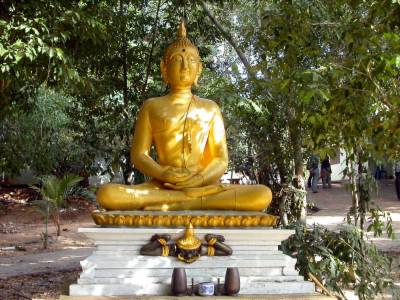
As a follow up to part of my post of Nov. 7, I would like to copy the following from another blog (in other words, I'm too lazy to post anything new today):
Tragedy at Tak Bai
Lost in the flurry of last-minute presidential election maneuvers, Tak Bai didn’t even register on the radar of most American media outlets. Thus few people are aware that the global ferment of politicized radical Islam is about to broach a new front--or that its targets this time are Buddhists.
The south of Buddhist Thailand is the country’s Achilles heel, a restive region that abuts Muslim Malaysia. A significant number of people in this area are Muslims, and many among them perceive discrimination from the Buddhist majority. In what has become a very old story told with slight variations around the world, this feeling of isolation and disenfranchisement leads some to advocate for a state of their own. As feelings run high and rebels start to attract attention (sometimes through violent means), the authorities panic and respond with force, setting off a new round of protests. And thus the vicious cycle of local samsara is set in motion to revolve perpetually.
Just such a situation has persisted on a major scale in Sri Lanka for decades, with the Buddhist Sinhalese and the Hindu Tamils locked in a karmic process that has no clear conclusion. Now the stage has been set for misery in Thailand. Violent incidents by Muslim separatists have escalated dramatically this year. Often such attacks are targeted at Buddhist icons as the symbols of non-Muslim culture. Taking a page from the insurgents in Iraq, Thai Muslims have kidnapped and beheaded Buddhist monks. Others have stormed police stations. The situation has been growing more heated, until finally everything was set in place for the tragedy of Tak Bai that took place last week.
When approximately 2,000 Muslim youths gathered for a protest in the southern town of Tak Bai, the mainly Buddhist military police snapped. Most of the protesters were partially stripped, forced to the ground, and had their hands tied behind their backs. Many were beaten. Then trucks were brought in to relocate the youths. They were picked up and bodily thrown into the vehicles, stacked horizontally in piles (hands still bound behind them), and taken off. When the trucks reached their destination six hours later, seventy-eight of the prisoners were dead and many more were wounded. Some had suffocated, some died of heatstroke, while others had their necks broken. Pictures filtering out of Thailand resemble a grisly cross between the genocide of Rwanda and the humiliations of Abu Ghraib. As horrible as this incident was, it will probably be only a prelude of pain to come. Because in our modern globalized world the truth of interconnection is undeniable, and all local conflicts become world wars. Just as the separatists who beheaded monks took their cues from Iraq, the sudden flexing of brute force against Muslim prisoners will likely provoke a response from places much further afield than Thailand.
Osama bin Laden and his comrades are constantly searching for new indignities against Muslims in order to exploit them for political and ideological gain. Now with a prime recruiting tool in the truly horrific actions of the Thai security forces, it won’t be long before money, arms, and perhaps trained guerrillas begin trickling into southern Thailand. And as the struggle heats up, the American military will likely respond in kind, offering weapons and expertise against “a common enemy.” Thailand’s woes won’t likely approach those of Sri Lanka, since the percentage of Buddhists to non-Buddhists is dramatically higher. There simply isn’t any chance that the separatists will win. But that doesn’t mean that both sides won’t reap considerable misery in whatever conflict follows on last week’s events. And in the process, Thailand’s famously happy and relaxed culture is sure to undergo disturbing shifts. Buddhism is already political in Thailand, where the king is a religious figure and his birthday a major holiday. Only time will tell whether the country’s Buddhism will become linked to intolerant nationalistic platforms, as it has in Sri Lanka, or whether a more compassionate dhammic solution is found.
Meanwhile, in a world characterized by the mutual interpenetration of all things, this is far more than an isolated local incident. There is no “over there” that Americans, Buddhist or otherwise, can safely hide behind. Much of the fund-raising for the extremely violent Tamil rebellion in Sri Lanka comes from North America, while Thai troops have taken part in the “Coalition of the Willing” that has brought moderate amounts of freedom and up to 100,000 civilian deaths to Iraq. As we look at Iraq, at Tak Bai, at Ground Zero, at Sri Lanka, at Afghanistan, and try to tally the scorecard of victories and defeats by our allies and enemies, we need to reflect on the pernicious effects of exporting war in the name of peace and sowing chaos in the name of freedom. The Dalai Lama often exhorts us to look upon all beings as our mothers, and to generate loving-kindness toward them for the nurture they gave us in innumerable previous lives. But there is another way of phrasing this infinite inner togetherness that all beings share, a way which is starker but perhaps more appropriate for the times we live in. If all things rise dependent on one another, if in the timeless past every person has held every possible relationship in regards to every other one, then as we survey the latest headlines with dismay, another formulation grimly rises before us: all beings have been our victims.
originally posted by Tricycle Blog at 11/1/2004 11:40:21 AM

No comments:
Post a Comment